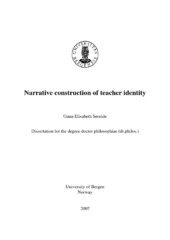Narrative construction of teacher identity
Doctoral thesis
Permanent lenke
https://hdl.handle.net/1956/2532Utgivelsesdato
2007-08-14Metadata
Vis full innførselSamlinger
- Department of Education [300]
Sammendrag
There has been an overemphasis within narrative approaches to teacher identity to use autobiographical material and personal accounts from teachers or teacher students as material sources for analysis. Very few studies draw on alternative empirical sources as a point of departure to investigate the narrative construction of teacher identity. This thesis therefore investigates how teacher identity is narratively constructed by three significant actors within the Norwegian elementary school system. In addition to a) transcribed texts from interviews with female elementary school teachers the project draws on texts from two other sources: b) public school policy documents and c) written material from the Union of Education Norway. These three actors are perceived as three different, but equal sources of material that are explored in three separate studies that constitute the core of this thesis. Public narratives about teachers are the unit of analysis in this thesis. The material is analysed within a theoretical and methodological framework inspired by a combination of poststructuralist, discursive and narrative approaches to identity and research. This framework has generated five analytical concepts that are divided in two main categories. The first category is called “narrative resources” and refers to the ‘what’ of identity construction, in my case, subject positions and constructions of identities. The second category is called “narrative editing” and refers to the different ways storytellers draw on and combine the narrative resources, or the ‘how’ of identity construction. This thesis focuses on three such editing techniques, namely; positioning, narrative plots and counter narratives. The identity construction of “The teacher as pupil centred, caring and including” is identified as especially paramount in all the three studies. Consequently discussions centre on how this teacher identity has gained such a prominent position. These findings are firstly interpreted as an indication that the three sources of material are inscribed in and informed by the same powerful Scandinavian educational discourse on individualisation. Secondly the thesis claim that this identity constructions also might gain prominence because it represent what is perceived as a necessary adjustment or alternative to certain teacher identities, educational values and conceptions of learning and childhood. Finally the thesis show how this teacher identity is constituted in a web of multidimensional dichotomies, and how it is the sum of these that contribute to the constitution, fixation and dominance of the teacher as pupil-centred, inclusive and caring in the public narratives. The project illuminates how analysis of narratives and statements can give insight in to some of the forces that move within educational discourses. The three studies underscore how complex and multifaceted the narrative construction of teacher identity can be and consequently provide an understanding of elementary school teachers that goes beyond the most obvious cultural stereotypes. The thesis shows that to get a conception of why teachers are positioned within certain identities, it is vital to understand how they come to be positioned in such a way.
Består av
Paper I: Teachers and Teaching: Theory and practice 5 (12) Søreide, G. E. (2006), Narrative Construction of Teacher Identity: Positioning and Negotiation, pp. 527–547. Copyright 2006 Taylor & Francis. Published version available at: http://dx.doi.org/10.1080/13540600600832247Paper II: Journal of Education Policy 2 (22) Søreide, G. E. (2007), The Public Face of Teacher Identity: Narrative Construction of Teacher Identity in Public Policy Documents, pp. 129–146. Copyright 2007 Taylor & Francis. Published version available at: http://dx.doi.org/ 10.1080/02680930601158893
Paper III: Søreide, G. E. “Teacher union and teacher identity”. Preprint submitted to Nordisk Pedagogik / Nordic Educational Research (in press)
